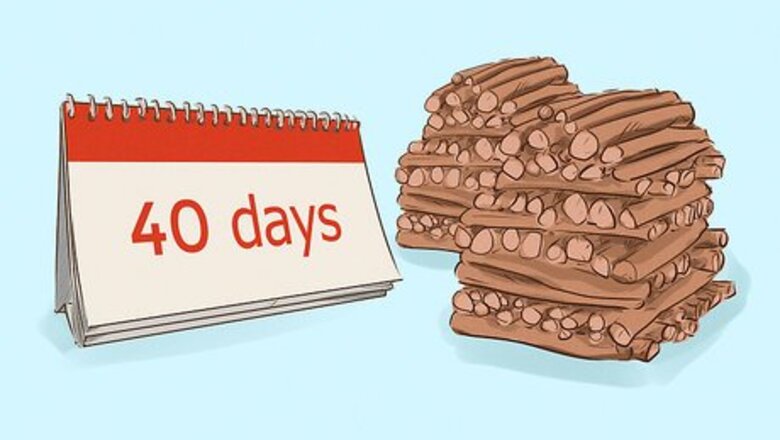
views
Like many festivals, Holi is celebrated differently by people of different faiths and backgrounds. What remains the same is the warmth and the spirit of this day. Whether you’re lighting the Holika bonfire, playing with colors, or visiting friends and family, Holi is a wonderful celebration to bring the community together to celebrate the triumph of good over evil.
Lighting the Holika Bonfire
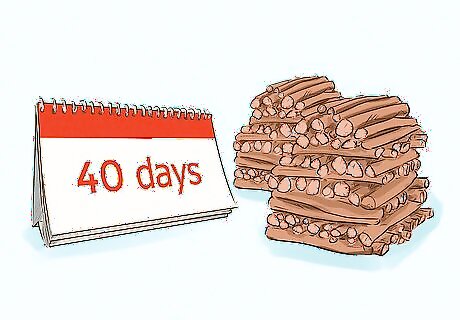
Collect and stack the wood. Make your bonfire in an open space away from trees, and have an adult light it. The day the holika is burnt is called "Choti Holi", literally meaning, "Small Holi". The next day is called "Rangwali Holi", meaning the "Holi of colors." Traditionally, 40 days before the Holi celebration, there would be a log placed in the center of the town to signify it was time to collect wood for the Holika bonfire. Gather enough wood and combustible material to create a medium-to-large sized pile for your Holika bonfire. Place any wood or flammable scrap materials on top of the log, so you have a large pile of wood ready to burn. Clean your home before the festivities.
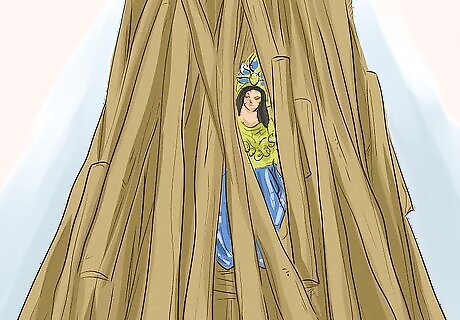
Place the statue of Holika on the wood. On the eve of Holi, place a combustible statue of Holika, the sister of the demon king Hiranyakashipu, in the pile of firewood. Burning Holika in the bonfire symbolizes the triumph of good over evil. She is said to have tried to kill Prahlad, the son of Hiranyakashipu (her brother). Prahlad was a devoted follower of Lord Narayana which infuriated his father who craved all the praise for himself. He plans to kill his son but he escapes because of his faith while holika gets consumed in the fire for her wickedness, despite her gift of escaping fire. You can tie the logs together so they stay in place vertically.
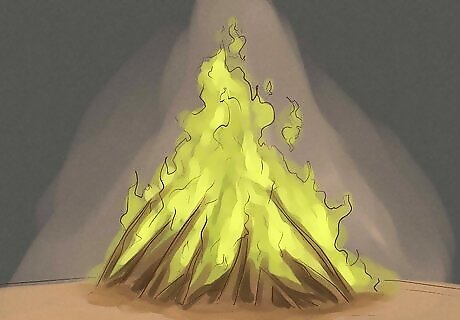
Light the bonfire. Light a match and throw it into the pile of wood to start the fire. You can pour a fire starter like kerosene on the wood to help get the fire going. Focus on the destruction of evil as you see the fire burn. Make sure to stand far from the wood when trying to start the fire so you don’t get hurt. Also, keep a check on cables or wires around the fire, if any. Wear cotton clothes and hold back your scarves, long hair, etc. Gather friends, family, or the community together to watch the Holika bonfire light.
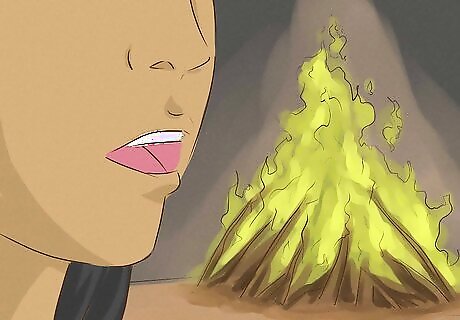
Chant the Rakshoghna Mantras. While you watch the bonfire, chant the Rakshoghna Mantras. These mantras are found in the Rig Veda, an ancient Indian collection of the Vedic Sanskrit hymns. Enjoy the fire by dancing around it and chanting the mantras to ward off evil spirits. You can find the text for these mantras online or by purchasing a book of the Rig Veda.
Preparing for Holi

Choose your outfit. If you would like to flaunt your colors after the celebration, you can sport light-colored or white clothes. This way you get to show off and see for yourself how well you enjoyed Holi. If you don't want to spoil your clothing, you can opt for old, worn-out clothes that you are willing to discard soon after the play. The idea is to have fun, so you can choose appropriate clothing based on your preferences.
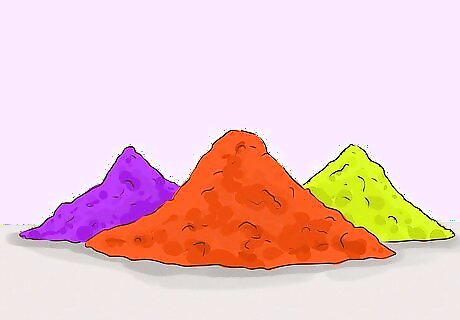
Buy or make colors. On the day of the Holi celebration, people celebrate the end of winter and the coming of spring by showering each other with brightly colored powder and water. You can buy gulal (colored powder), which is a natural red-orange color made from the flowers of palash. The flowers are dried and ground to create a powdered color. You can also buy abeer, which is small crystal chips of mica that create a sparkly silver color. People frequently combine the two to create a fun red-orange sparkly colored powder. Red, pink, yellow, green and violet are the most used colors. Try a test patch on your wrist to check you aren’t allergic to the chemicals in the colored powder, especially if you are celebrating it for the first time. If you have sensitive skin or skin issues, buy organic colors that don't cause redness or itchiness. There are colors available that are made from rice flour and natural colorings. Look online to buy Holi colors for the festival. Use turmeric powder instead of yellow color. It is considered good for skin too. You may have to make sure you bathe quickly after the celebrations because even turmeric marks don't wipe off easily.
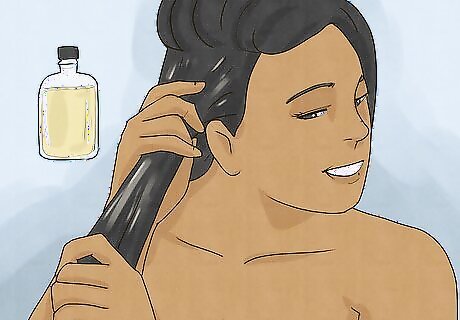
Take safety steps for skin and hair. Apply cream on the face and hands and any exposed areas so the color does not penetrate deeply. You can oil your hair a little so that you’ll be able to remove the color easily with a single hair wash. If you have to go to school or work the next day, you can use oil or cream especially around their ears, because the marks there don't wash off easily. Close your eyes whenever you can when someone smears color on your face. Wipe or wash your face soon after.
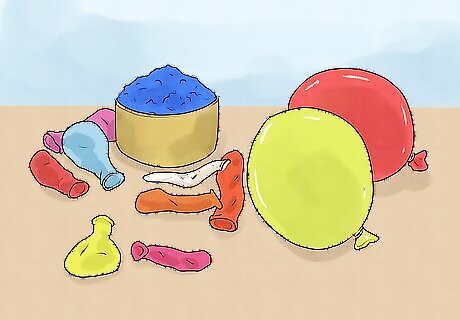
Buy balloons. Buy plenty of small balloons and plastic pouches to fill in water and hurl at your friends. Use your water gun or pichkari to fill them with water.
Celebrating Holi
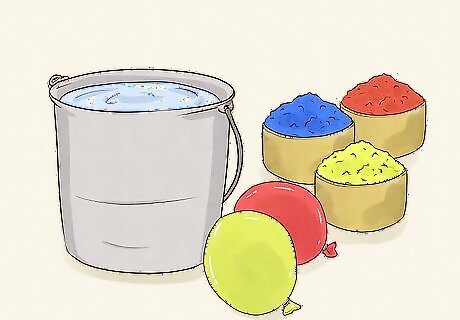
Fill a bucket of water. Wake up early on the day of Holi, and get your materials ready. Keep water handy throughout the day. Make sure the tap is close to your play area. Attach a hose to the tap if you can't go back and forth with colored feet. You will mix colored powder in the bucket of water and fill the balloons and pichkaris. Fill as many balloons as you’d like with water and tie them. Get them ready beforehand. At the end, you can empty the entire bucket on your friends for a big finish.
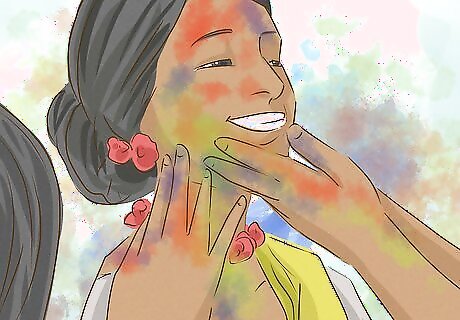
Smear color on your loved ones. Smear the colored powder onto your friends and family to make them colorful and commence the festival of colors. The colors are non-toxic and won’t stain for long, so have fun smearing them on your family members' arms, legs, back, and hair. Others like to celebrate low key day Holi with little to no water. You can do that too and celebrate with some beautiful colors and food. Elders and friends shout, "Bura na mano, holi hain" to allow people the liberty to apply color on them. It means, "Don't mind; it’s Holi". Or "Don't feel bad; it is Holi".
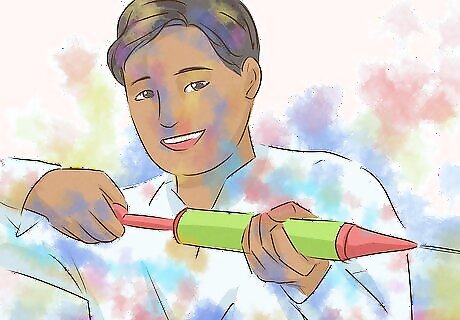
Spray colored water with pichkaris. A pichkari is a water gun to squirt colored water from as a fun way to celebrate Holi. Mix some of the colored powder with water and then add it to the pichkari. Use the pichkari to cover people with colored water and enjoy playing in the bright colors. Pichkaris make great gifts for kids in preparation for the Holi celebration. They come in many forms and patterns. Pick the basic cylindrical ones to go old school or try the fancy ones if you like. Be ready for some naughty kids to throw water balloons on you from their terrace or home.
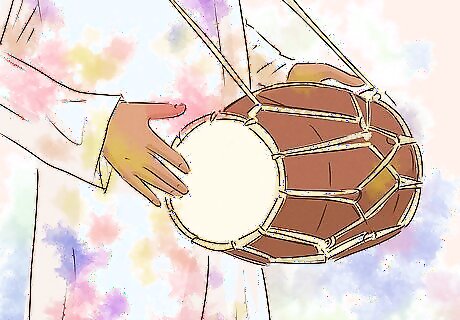
Sing and dance to the beat of the dholak. A dholak is a hand drum that is played at celebrations such as Holi. Enjoy the celebration by dancing in the colors to the beat of the dholak. Sing Holi songs and let your body move to the beat while you celebrate the coming of spring.
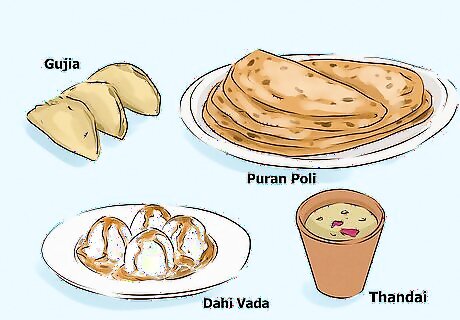
Eat and drink traditional Holi delicacies. A great way to celebrate Holi is with delicious traditional Indian meals. There are many different traditional meals for Holi depending on what region you are in, but here are some popular foods and drinks you can try. One Holi staple is Thandai, a traditional creamy milk drink flavored with nuts and spices. It often has some herbs that might make you feel dizzy. You may drink it after you've enjoyed together. Gujia or Ghughra is a sweet dish which you will enjoy. Puran Poli is a popular sweet dish typically eaten in Maharashtra. It is a sweet flatbread with a buttery taste and a stuffing of lentils, jaggery, and spices. It is eaten with sweetened milk or spicy dal curry. Dahi Wada is a tasty snack food made from lentil fritters soaked in Indian yogurt.
Breaking the Pot
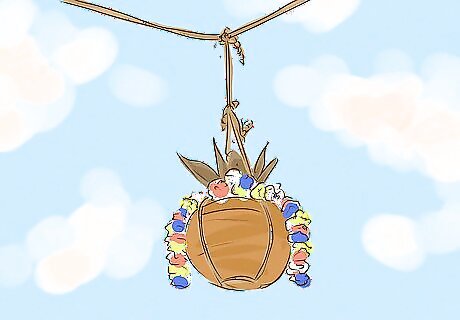
Hang a pot of buttermilk in the streets. One older tradition of Holi is the breaking of the pot. First you string up a ceramic pot of buttermilk in a street. It is said that Lord Krishna was very fond of buttermilk and would steal it from the houses in the village. To hide it from young Lord Krishna, the women would hang the buttermilk high up in the streets.
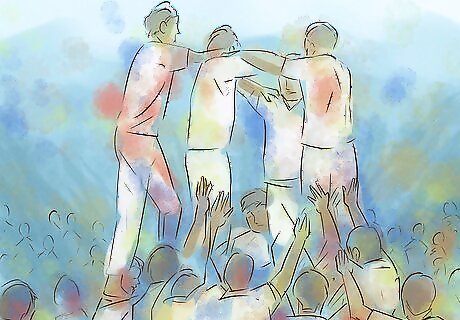
Form a human pyramid with the men. The men in the town form a human pyramid by balancing on each other's backs or shoulders. The pyramid should be tall enough for the person on top to reach the pot of buttermilk. Be careful balancing on another person’s back or shoulders. This can be extremely tricky and requires a lot of balance.
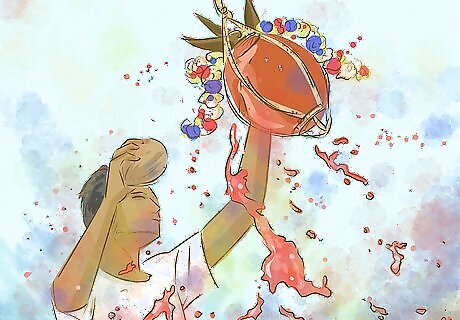
Break the pot. When the pyramid gets tall enough for the one on top to reach the pot, break the pot of buttermilk. You can break the pot with your head, hands or a strong object. Make sure you practice making the human pyramid before the final day. And also practice climbing down systematically without straining anyone's shoulder or having anyone fall.
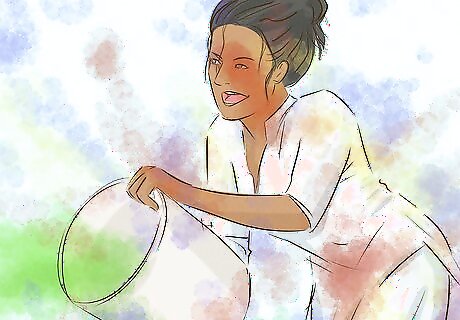
Sing Holi songs and throw water. The women of the town surround the men in the pyramid. They have fun singing traditional Holi songs and throwing buckets of water. The women should enjoy singing and dancing around the men in celebration of Holi.
Visiting Friends and Family

Go to a friend or family member's home. At the end of the evening when the celebration of the colors has subdued, many people like to visit friends or family to enjoy the evening. Holi is a celebration meant to bring together the community so it culminates with coming together and relishing in the day’s festivities.
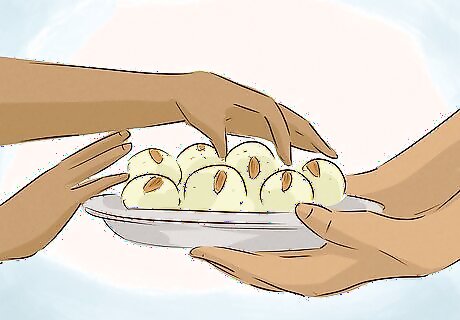
Exchange sweets with them. It’s customary to bring sweets to exchange with your friends and family when you visit them. People bring traditional Indian delicacies to enjoy together creating a great end to the celebration. Gujia, Coconut Burfi, Rava Laddoo, or Carrot Halwa are most often cooked and shared.
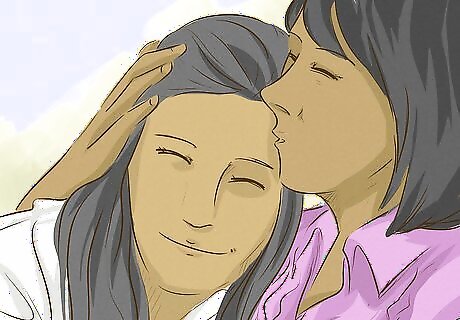
Enjoy an evening with loved ones. Some towns organize large Holi get-togethers in the evening, but you can also just enjoy visiting your friend's home. Watch Holi songs and movies on television that are shown specially on the day of Holi. Exchange hugs and well wishes with friends and family to celebrate Holi and the spirit of brotherhood. Holi truly is an all-day celebration.










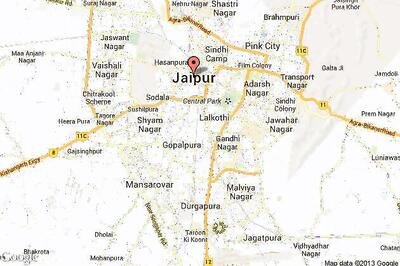






Comments
0 comment